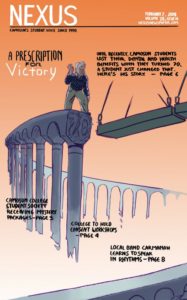Like most Canadians, I don’t give democracy much thought. I take it for granted; I’ve always had it. But what does it really mean? Does it simply mean I can vote? In truth, that’s probably what most of us think of when we hear the word “democracy.”
What about freedom? Does it mean that? Some would argue that democracy does not equate to freedom, but I wonder how you can have democracy and not also have at least some degree of civil liberties as a result.

Watching national and provincial student organizations take and argue about our money is an interesting exercise in observing what should be a democracy.
We elect officials to government and other institutions based on the desires we have for our society and the outcomes we would like to see accomplished. Maybe the feeling of freedom comes from knowing this, and from knowing that we will be provided with opportunities to be heard by attending public hearings, filling out surveys, and voting on important matters, such as in a referendum.
Perhaps the feeling of freedom also comes from the peace of mind we have in knowing that if we do not like the way the powers that be are doing things, then we can simply vote them out. Granted, we must allow a certain leeway in order for the people we elected to actually do what we elected them to do free from our interference, but at the end of the day, I still think we know deep down that we, the voters, will have the final say.
Or will we? Let’s bring this away from the conceptual and to Camosun, and into the pockets of Camosun students.
The latest saga between the Canadian Federation of Students (CFS) and the British Columbia Federation of Students (BCFS) may cause us to re-evaluate whether or not voters have the final say.
We’ve decided to model many of our organizations after the government model of democracy, and the CFS is no exception. There is currently a he said/she said going on between the BCFS and the CFS regarding the remittance of Camosun student fees (see nexusnewspaper.com for our full coverage of the issue). The Camosun student body has indicated its desire to hold a referendum to decide whether or not to defederate from the CFS. Yet the CFS states that the referendum cannot be held until the BCFS remits to the CFS approximately $200,000 of Camosun students’ CFS fees given to the BCFS by the Camosun College Student Society. The BCFS says that it’s allowed to hold on to that money because it is a provincial component of the CFS, and that the CFS has no right to stop the referendum.
Regardless of which organization is right, here’s one truth: Camosun students are paying fees to both organizations until it all gets settled, and, for now, they are— literally—paying for an imperfect democracy.
How can the CFS stand in the way of Camosun students voting to leave the organization? Doesn’t it seem counterintuitive that the CFS would be able to wield that much power over whether or not students vote on a matter that would determine their own fate?
It does leave one to wonder where democracy ends and something else begins. If the powers that be hold all the cards and ultimately have the freedom to ignore a call for a referendum from the public that elected them, then does that nudge them more toward dictatorship? At the very least, it could be construed as an abuse of power, or taking advantage of their position to block a referendum where the outcome may prove unfavourable for their organization.
